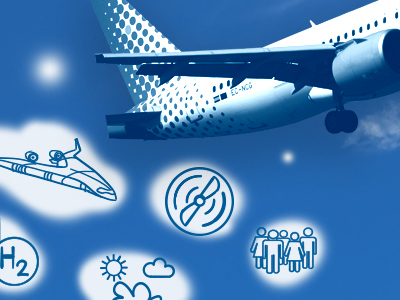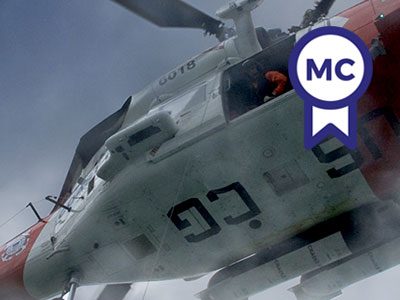Overview
Course video
Learn about the multi-disciplinary aspects of urban air mobility (UAM) vehicle design, performance and control, and keep up to date with the latest developments of this novel mode of transportation.
Urban air mobility is a revolutionary mode of transportation meant to optimize routes and shorten travel duration. It can be realized with innovative eVTOLs –electric vehicles, capable of taking off and landing vertically. Due to its increased flexibility, this mode of transportation can decongest metropolitan routes in critical areas with high traffic density. In just the last few years, the sector dedicated to air vehicles has shown impressive progress with several major companies already developing different types of electric solutions.
A multi-disciplinary approach
This course combines the multi-disciplinary aspects of vehicle design and operation. You will learn about concepts related to design – from aerodynamics and aeroacoustics of propulsion systems to powertrain and structural architectures – and operational aspects – such as vehicle control and stability, and ground infrastructure, to be integrated in a specific mission. Participants are given the option to specialize in one (or both) of these two fields.
After taking this course you will be able to:
- categorize and compare different vehicle typologies, evaluating the technical and regulatory requirements per mission, and anticipating the problems to be solved for each of them.
- evaluate aerodynamic and aeroacoustic performance, and additional aspects of integration into urban environments, to produce a complete vehicle design of your choice.
- estimate the structural characteristics for vehicle components such as wings, rotor supports and landing gear.
- discuss flight control, trajectory optimization and manoeuvrability specific to UAM and its integration into the urban environment.
- discuss optimal vertiport layout based on mission and urban environment constraints.
The course uses interactive assignments and interviews with industry experts to pave the way to a complete understanding of the topics.
The course has been designed by experienced professors, industry partners and researchers that are part of TU Delft's Personal Air Mobility Group created to study and integrate disruptive vehicle configurations in the urban environment.
Top UAM experts to gather in 2026
The Delft International Conference on Urban Air Mobility (DICUAM 2026), organized by TU Delft in collaboration with industry leaders, will gather specialists from several domains to discuss the scientific and technological challenges for eVTOL vehicles. As a participant of this course you will be entitled to a 50% discount on the conference fee.
Details
Is this course for you?
This course will be beneficial for engineers working in the aerospace industry with backgrounds in mechanical and electrical engineering, applied physics or mathematics. The multi-disciplinary nature of the topics, including the vehicle design, which covers propulsion, aerodynamic and aeroacoustic parameters and also operational aspects such as control, stability and urban integration will help participants in their specialization. They will benefit from an improved capacity to become more effective in decision making within multi-disciplinary projects.
This course is also suited to young professionals or entrepreneurs interested in vehicle/drone design and evaluation with the target of urban integration or certification.
This course can also prove a beneficial addition to the learner's portfolio when considering a spin off in engineering and mechanics, where technology needs to encompass additional disciplines to produce the best solutions.
Course Syllabus
Module 1: UAM configurations based on mission requirements
This module contains information about UAM vehicles, missions, environments, and operational aspects. You will get acquainted with the technical terminology of vehicles. We will focus on:
- The societal relevance of UAM and the possibilities given by the different vehicle approaches.
- General introduction to vehicle certification with examples.
- Operational aspects of different vehicles based on their mission.
- Societal impact, emitted noise, visual aspects.
- Vehicle classification based on configuration, requirements, energy supply, mission.
- Components, system analysis, and structural aspects.
Module 2A: Propulsion systems
This module presents the aspects related to the single system including aerodynamic aspects and the configuration of the propulsion systems. The following sub-topics are discussed:
- Aerodynamics/acoustics of the propulsion system, including single propeller, distributed rotors, and installation effects.
- Vehicle power and performance, including energy sources with specific application to electric propulsion.
- Vehicle structure design with specific focus on wing and landing gear.
Module 2B: Vehicle operational aspects
This module presents the aspects related to the operation of different vehicles, including vehicle control, air-traffic management of multi-systems, and modification of infrastructure. The following sub-topics are discussed:
- Vehicle dynamics of isolated vehicles.
- Management of multiple vehicles.
- Integration in the urban environment.
Qualifications
Certificates and CEUs
If you successfully complete this course you will earn a professional education certificate and you are eligible to receive 3.0 Continuing Education Units (CEUs).
Chartered Engineering Competences
All our online courses and programs have been matched to the competences determined by KIVI’s Competence Structure, a common frame of reference for everyone, across all disciplines, levels and roles.
These competences apply to this course:
- A1: Extend your theoretical knowledge of new and advancing technologies.
Admission
This course is primarily geared towards working professionals.
Prerequisites
Knowledge of fundamental physics and calculus is a requirement. However, the course will fill in any gaps of knowledge in basic aerodynamics and control theories.
Contact
If you have any questions about this course or the TU Delft online learning environment, please visit our Help & Support page.




